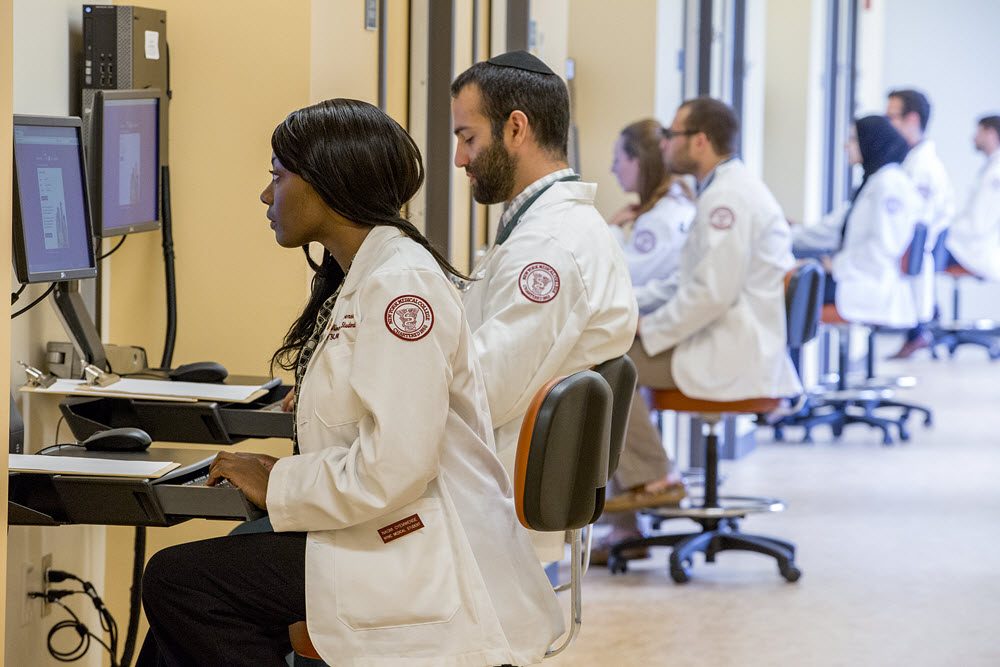New York Medical College Introduces Health System Science Intersession Series for First-year Students
Transforming students into physicians who are dedicated to providing compassionate, respectful, and accountable patient-centered care to all patients

The New York Medical College (NYMC) School of Medicine (SOM) instituted a new series of Health System Science Intersession mini-courses for first-year medical students. The second intersession in the series focusing on population and social determinants of health took place during the first week in January.
Previously, SOM first-year students attended a session during orientation in August on the introduction to the health care system and collaborative practice, which included elements of implicit bias. Future sessions this academic year are planned on research fundamentals and evidence-based medicine and during the students’ second-year on quality and leadership in teams, healthcare economics, policies and structures and patient safety and high-value care.
“We developed the Health System Science Intersessions to ensure that our students are prepared to function in the increasingly complex health care system of today and in the future so that they can provide optimal, personalized, high value care to patients and populations,” said Pamela Ludmer, M.D., M.M.E.L., associate dean for curriculum integration and clinical assistant professor of medicine and pediatrics. “We chose the intersession format to ensure students could focus fully on these critical topics without the distraction of their required biomedical science courses. The content reflects both the framework on Health System Science from the American Medical Association, as well as a recognition of current events and issues.”
For the January intersession on population and social determinants of health, a diverse group of faculty and healthcare workers was involved in the development and delivery of the content, which included a mix of large and small group sessions, panel discussions and standardized patient encounters, all done virtually. Topics included social and medical history of tuberculosis, ableism, neighborhood and physical environment, hot topics in COVID-19, ethics, and social determinants of health, as well as panels on food instability, maternal and child health and the prison pipeline.
“To ensure we are transforming our students into physicians who are dedicated to providing compassionate, respectful, and accountable patient-centered care to all patients, the NYMC SOM is implementing a longitudinal antiracist, anti-bias health inequities curriculum, some of which is included in the Health System Science thread,” said Dr. Ludmer. “A critical component of that is educating our students on the tools to implement five levels of structurally competent interventions: the individual level, the interpersonal level, the community/institutional level, the policy level and the research level.”
Daniella Maraia, SOM Class of 2024, was among the students who participated in the January session. “I particularly appreciated the talk given by Jeffrey O. Patrick, M.P.H. ’20, instructor of medicine and public health advisory regarding advocacy because it really addressed the complexities and apprehensions involved in combating the injustices that are so prevalent in our society. Positioning this talk at the beginning of the week laid the groundwork for us as students to become inspired as we were introduced to more specific issues in subsequent talks,” said Ms. Maraia. “I entered this week slightly anxious as I recognized that we would be discussing particularly sensitive topics. Nonetheless, my reservations were gradually eased as I realized how my classmates and I could responsibly advocate for our patients. This week helped me to understand that although as M1 students we are at the beginning of our training and still have a lot to learn, it is so important that we recognize these issues now and place them at the forefront of our minds as we navigate medical school and beyond.”
“I am very grateful to be receiving my medical education at NYMC and to have the opportunity to participate in these intersession courses,” said Harli Weber, SOM Class of 2024. “During this intersession we focused on social determinants of health and how these factors contribute to health disparities, focusing on how we as future physicians can help to eliminate these disparities and to ensure that all patients are receiving quality care. I was particularly inspired by hearing the firsthand accounts from panelists regarding food insecurity, the prison pipeline, and health inequities in people with disabilities. These thoughtful and powerful discussions challenged me to reflect on how I can begin to make a change, even as a first-year medical student.”
“My main takeaway from this week was that medical care does not equal health care,” said Dena Phillips, SOM Class of 2024. “For example, the lecture by Neil Schluger, M.D., chair and professor of the Department of Medicine, about tuberculosis really showcased that while we can develop excellent medical solutions to disease if people cannot access it due to social factors, we cannot adequately improve the health of that population.”
Ms. Phillips also shared that while the sessions at the beginning of the week focused on the health disparities and inequities in the United States and all over the world, which were somewhat disheartening, the panels later in the week about food instability, maternal and child health, and the prison pipeline were very inspiring. “Those discussions showed that though many people don't have what they need to live good healthy lives, actions are being taken and what we can do to help. From donating millions of pounds of food in the New York area this year to changing the life of one foster child through medical care that is personalized and compassionate, there are programs in place that are helping to improve the health of the population.”
“For me personally, this course showed me that a career in advocacy is possible as a physician, and also taught me the extreme importance of looking at each patient's life as a whole to help them,” said Ms. Phillips. “Just prescribing the appropriate medication isn't enough if the patient cannot afford it or doesn't have transportation to obtain it. So, thinking about all the social determinants of health is essential in providing excellent medical care.”
